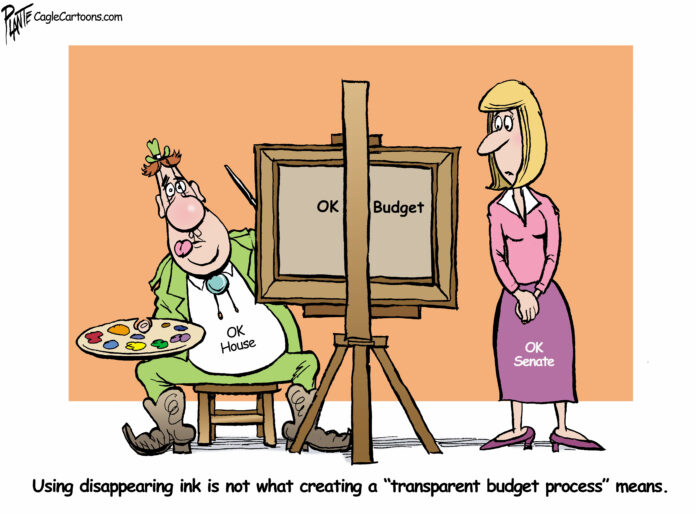Eyes roll anytime legislative leaders pledge more budget-writing transparency.
It’s pure reflex. It can’t be helped. It’s ingrained in those who pay even the remotest attention to the annual state-spending horse-trading for one, simple reason: it’s long been a hollow pledge.
Transparency often is the final public promise before a College of Cardinals-esque group of budget writers don their green eyeshades and slip behind closed doors, not to be seen again until – voila! – billions of tax dollars are spoken for.
The other 95% of elected lawmakers then are given mere hours to scan the final product before being forced to vote. Take it or leave it. No changes allowed.
This year, though, there is cautious optimism that budgetary poohbahs actually will be more open about how they prioritize spending about $12 billion of the taxpayers’ treasure. Emphasis on the word “c-a-u-t-i-o-u-s.”
The Senate has led the campaign for openness. Even going so far as to overwhelmingly approve a budget blueprint developed from 33 open-to-the-public subcommittee meetings. Known as Senate Resolution 31, it was sent to the House on March 18. The Senate then waited for the House’s plan. And waited. And waited. Until last week.
When it came time for the Senate Appropriations Committee to consider House-generated budget bills, it refused … because the spending proposals weren’t specific.
“The purpose of this new budget process is to keep Oklahoma citizens informed and engaged about how we’re spending taxpayer dollars,” said Chairman Roger Thompson, R-Okemah. “We do this by shining light on the entire state budget process.
“We cannot just shine a light at the beginning and then fall back into darkness halfway through the process. We will not let the House drag us back into darkness in this budget process.”
For its part, the House contends it asked the Senate two weeks ago to first help resolve a $20 million hole in the current year’s state Department of Education budget. Since the two chambers have different fixes in mind, neither is cooperating – at least for the moment – on next year’s budget, though Senate President Pro Tem Greg Treat and House Speaker Charles McCall finally squeezed in a closed-door summit of sorts – no major announcements followed.
For those who enjoy legislative sausage-making, the standoff is entertaining in a get-the-popcorn-popping sort of way. But for those whose public policy interests involve granular spending details, it’s disconcerting, if not downright alarming
As you know, Treat and McCall already are at odds over the speaker’s call – supported by Gov. Kevin Stitt – for another round of income tax cuts.
How that is resolved potentially impacts hundreds of millions of dollars needed to boost long-underfunded, vital state services, ranging from mental health to public education.
Could behind-the-scenes horse-trading result in legislative leadership attempting to ram through some truly awful, anti-democratic proposals, like revamping the selection process for appellate judges – which would further tilt the legal playing field in favor of the wealthy and against workaday Oklahomans – or straight-jacketing initiative powers that enable The People to act when a corporate-controlled Legislature won’t?
And then, for good measure, there’s this: Even Senate Democrats support the “new, transparent budget process” to “ensure members and the public have access to all the information, facts and figures in preparing a balanced budget,” according to Senate Democratic Leader Kay Floyd.
“Senate Democrats remain committed to promoting transparency and greater accountability on behalf of the citizens of Oklahoma and to finding bipartisan solutions to the real challenges facing our state.”
Business as usual? Or real transparency? Stay tuned.








